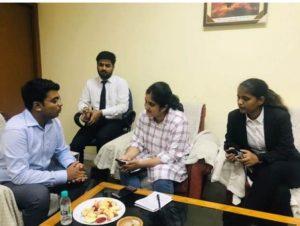1. Can you tell us a little about yourself?
My name is Gandhrv Patel and I am an alumnus of Faculty of Law, Lucknow University and former convener of the legal aid center at the campus, where I worked in it tirelessly to make a difference in the society. I joined Delhi University for my LLM but later, I left it to focus myself on preparing for Judiciary
2. Why did you choose judiciary as a career?
The fire for judiciary as a career option first sparked when my father asked me to think over it. Like most parents, my father wanted me to become a law officer and I listened to him, while pursuing my studies, I started focusing on law as well and with time, I generated keen interest in the field and it became a potion for me, I knew that I have to go for judiciary surely at that time.
3. What does it require to crack judicial services?
Since the judicial exams are conducted by states and different states have slightly different criteria for conducting the examination and selecting the candidates. So, it is not like, if you have a single mantra, you will get it done easily. It requires smart studies and preparation keeping in mind of which state you are giving the examination Let’s say, If the aspirant is preparing for Uttar Pradesh, Jharkhand, Bihar or Rajasthan judiciary, then he needs to focus on bare provisions and a thorough study of theory. On the other hand, if he is preparing for Haryana, Himanchal Pradesh or Delhi judiciary, then a great knowledge of case laws and practical aspects is necessary. If he has a command on Hindi then he should focus on theory.
4. What are the stages of appearing in judicial service exam and the right way to do it?
We all know that there are three stages of examination, the first one is preliminary, then, there are mains and at the last, there is the interview. Now, there is a slight difference when it comes to subjects in preliminary examination and the mains. The students who is preparing for the test prepares for both, so if the aspirant will prepare for mains he will eventually prepare for preliminary as well.
If we talk about some important subjects to study for these two stages, Jurisprudence, Constitution Law and International Public Law are important for preliminary examination. Interviews can be tricky, so in order to get through it with ease, a candidate should rely on giving mock interviews before the actual interview so that she/he gets free from hesitation and gets more used to with the kind of questions asked.
5. What do you think is the ideal time to start preparing for Judicial Services? Also, what is the influence of activities like moot courts, research papers etc., and what according to you helps the most in cracking judicial services examination?
Because the questions framed for the competitive examination are from the syllabus which is taught in the law schools be it a five years or a three years course, thus there is no fixed time to start preparing for it, so the candidate must do a thorough study of his syllabus on a continuous basis.
Moot courts per se are not essential if the aspirant is preparing for judiciary, it is more important to connect with the society at grassroot level .This can be achieved by working with institutions that work for the welfare of the society as it will give you a better understanding of the society and its problem.
6. What influence do you think Lucknow University has in helping you secure a place in the judicial services exam?
Yes, being a university graduate has helped me a lot. The most important thing is that our syllabus structure is very apt for judiciary so you don’t need to put in a lot of effort other than what’s being taught in the classes and thorough study of the syllabus helps you by a margin in preparing for judiciary.

